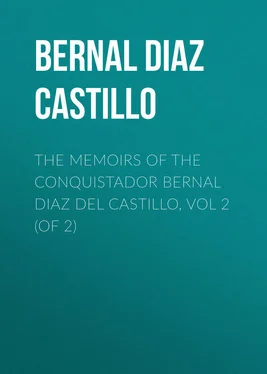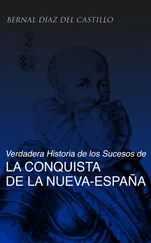Bernal Díaz del Castillo - The Memoirs of the Conquistador Bernal Diaz del Castillo, Vol 2 (of 2)
Здесь есть возможность читать онлайн «Bernal Díaz del Castillo - The Memoirs of the Conquistador Bernal Diaz del Castillo, Vol 2 (of 2)» — ознакомительный отрывок электронной книги совершенно бесплатно, а после прочтения отрывка купить полную версию. В некоторых случаях можно слушать аудио, скачать через торрент в формате fb2 и присутствует краткое содержание. Жанр: foreign_antique, foreign_prose, на английском языке. Описание произведения, (предисловие) а так же отзывы посетителей доступны на портале библиотеки ЛибКат.
- Название:The Memoirs of the Conquistador Bernal Diaz del Castillo, Vol 2 (of 2)
- Автор:
- Жанр:
- Год:неизвестен
- ISBN:нет данных
- Рейтинг книги:5 / 5. Голосов: 1
-
Избранное:Добавить в избранное
- Отзывы:
-
Ваша оценка:
- 100
- 1
- 2
- 3
- 4
- 5
The Memoirs of the Conquistador Bernal Diaz del Castillo, Vol 2 (of 2): краткое содержание, описание и аннотация
Предлагаем к чтению аннотацию, описание, краткое содержание или предисловие (зависит от того, что написал сам автор книги «The Memoirs of the Conquistador Bernal Diaz del Castillo, Vol 2 (of 2)»). Если вы не нашли необходимую информацию о книге — напишите в комментариях, мы постараемся отыскать её.
The Memoirs of the Conquistador Bernal Diaz del Castillo, Vol 2 (of 2) — читать онлайн ознакомительный отрывок
Ниже представлен текст книги, разбитый по страницам. Система сохранения места последней прочитанной страницы, позволяет с удобством читать онлайн бесплатно книгу «The Memoirs of the Conquistador Bernal Diaz del Castillo, Vol 2 (of 2)», без необходимости каждый раз заново искать на чём Вы остановились. Поставьте закладку, и сможете в любой момент перейти на страницу, на которой закончили чтение.
Интервал:
Закладка:
As soon as we had destroyed this aqueduct, our officers determined to make an attempt upon one of the bridges on the causeway leading from Tlacupa. We had scarcely begun to move along the causeway when numbers of canoes, filled with troops, advanced swiftly from both sides, while other large bodies of the enemy came marching up the causeway against us, so that we were quite astounded at the very sight. In the first encounter thirty of our men were wounded and three killed. Notwithstanding all this, we fought our way up to the first bridge. According to what we afterwards heard, it was the wish of the Mexicans that we should pass over the bridge; for we had no sooner done so than we were assailed by such terrific crowds, as to be unable to move. What indeed could we do on a causeway which was no more than eight paces in breadth, where we were attacked on all sides at once? Our crossbow-men and musketeers certainly kept up a continued fire on the canoes, but the enemy received but a trifling loss this way, for they had raised boards alongside of their canoes, by which their troops were sheltered from our fire. Those of the enemy's troops which attacked us on the causeway itself we certainly drove back each time into the water, but fresh troops kept pouring in too fast for us to gain much advantage this way. Here our cavalry was of no manner of use to us, while the horses were greatly exposed to the attacks of the enemy on each side of the causeway, and many were consequently wounded. If our cavalry attempted to pursue the enemy into the water, the latter had provided against this by palisades, behind which they retired, and stretched out against them their long lances, to which they had fastened the swords we unfortunately lost on our retreat from Mexico.
In this way the battle continued for upwards of an hour, the enemy each time returning to the attack with such excessive fury that, at length, we could stand our ground no longer: nor was this all, for we now saw another large fleet of canoes approaching with a fresh body of men, who were ordered to fall upon our rear. We therefore determined to retreat back along the causeway, for which purpose we ordered the Tlascallans to move off first, that we might effect our retreat in perfect good order. Here the Tlascallans had greatly embarrassed us in our movements, who, it is well known, never can fight standing in the water.
The instant the Mexicans perceived we were turning back, and saw the Tlascallans moving off the causeway, they set up most distracting yells, and attacked us man to man with great fierceness. It is indeed out of my power to describe it. The whole of the causeway was instantly covered with lances, arrows, and stones, besides that vast quantities fell into the water. When we had again reached the mainland, we returned fervent thanks to the Almighty for having rescued us from this severe battle.
Eight of our men were killed and fifty wounded: added to all this, we were obliged to put up with the hootings and jeers of the enemy, who kept calling upon the Tlascallans to come with double their numbers next time, and they would very soon settle their impudence. Our first deeds of arms, therefore, merely consisted in destroying the aqueduct of Chapultepec, and in reconnoitring the lake along the causeway, in which we did not exactly reap much honour.
For the rest, we passed the following night very quietly in our quarters, posted our sentinels, and dressed our wounds. One of our horses was so severely wounded that it died soon after.
The following morning Oli determined upon taking up the position assigned to his division at Cojohuacan, about six miles further on; and however Alvarado and the other cavaliers might beg of him not to separate the two divisions, yet he would not alter his determination. Christobal de Oli was a man of uncommon bravery, whose pride was wounded at the unsuccessful attempt we had made upon the causeway, and he accused Alvarado of inconsiderateness for having ordered the attack. Nothing, therefore, could induce him to stay, and he marched off with his men to Cojohuacan.
The separation of the two divisions was very impolitic at this juncture; for if the Mexicans had been aware of the smallness of our numbers, and had attacked either of the divisions during the five following days, before the brigantines had arrived, we should with difficulty have escaped destruction. Both divisions, therefore, remained as quiet as the enemy would allow them, though not a day passed by that the Mexicans did not land troops to annoy us in our camp, and, if possible, to entice us into places where we should be unable to act, and they could attack us to greater advantage.
Sandoval, as we have seen, left Tezcuco with his division four days after the feast of Corpus Christi, and marched towards Iztapalapan. His route lay through townships which were either subject to, or in alliance with Tezcuco. As soon as he arrived at Iztapalapan, he commenced his military operations by burning down the greater portion of the houses which stood on the mainland.
It was not long before large bodies of Mexican troops arrived for the protection of Iztapalapan, with whom Sandoval had a severe skirmish, and drove them back again to their canoes; but still they continued to shower their arrows and darts upon him, and wounded several of his men.
During this conflict a thick smoke was seen to rise from several signal fires which had been lighted on the surrounding hills. This had been a signal to call in all the canoes of Mexico and of the other towns situated on the lake, as Cortes had just run out from Tezcuco with the thirteen brigantines.
The first attack our general made with this fleet was against a rocky height on an island near Mexico. This place had been strongly fortified, and was garrisoned by a great number of Mexicans and inhabitants of other townships. All the canoes of Mexico, Xochimilco, Cojohuacan, Huitzilopuzco, Iztapalapan, and Mexicalzinco, had united in a body to oppose Cortes, which was the reason why the attack was carried on with so little vigour against Sandoval, who, however, was not able to do the enemy much damage, as most of the houses stood in the water; though, in the commencement of the attack, our allies had made many prisoners. In Iztapalapan, Saudoval found himself on a peninsula in the lake, and the only way by which he could reach Cojohuacan was by a causeway which ran half way through the lake, on which he would have been assailed from both sides by the enemy, without his being able to defend himself with much advantage.
When Cortes observed the vast number of canoes which kept continually crowding around the brigantines, he began to feel alarmed, and this not without reason, for their number amounted to above 4000. He therefore abandoned his attack upon the rock, and selected a position with his brigantines, where he would be able to observe all the enemy's movements, and steer off in any direction he might choose. He likewise issued orders to the respective commanders of the brigantines not to commence an attack on the canoes before the wind, which had just commenced blowing from the land, should have increased. When the Mexicans found our fleet was moving off again, they not incorrectly ascribed it to fear, and they immediately advanced with their canoes to fall upon the brigantines. There now suddenly arose a stiffish breeze, our rowers pulled with all their might, and Cortes ordered the brigantines to run right in among the canoes. Numbers were bored into the ground, many of the enemy killed and wounded, and all the rest of the canoes turned round, and made off at a rapid rate, to seek refuge between the houses built in the lake, where they could not be followed by the brigantines. This was our first naval engagement, and Cortes gained the victory, thanks be to the Almighty.
After this encounter he steered for Cojohuacan, where Oli had taken up his position. Here again he fell in with large bodies of the enemy, who lay in wait for him at a point of considerable danger, and attempted to carry off two of the brigantines. They attacked him at the same time from their canoes, and from the tops of the temples. Cortes now fired in upon them with the cannon, and killed great numbers. The artillerymen fired away so incessantly upon this occasion, that all their powder was consumed, and some of them had their faces and hands burnt. Cortes then despatched the smallest brigantine to Iztapalapan, to bring away all the powder Sandoval had with him there, and wrote word to him not on any account to quit that place. He himself staid the two next days with Oli, on whose position the enemy continued their attacks without intermission.
Читать дальшеИнтервал:
Закладка:
Похожие книги на «The Memoirs of the Conquistador Bernal Diaz del Castillo, Vol 2 (of 2)»
Представляем Вашему вниманию похожие книги на «The Memoirs of the Conquistador Bernal Diaz del Castillo, Vol 2 (of 2)» списком для выбора. Мы отобрали схожую по названию и смыслу литературу в надежде предоставить читателям больше вариантов отыскать новые, интересные, ещё непрочитанные произведения.
Обсуждение, отзывы о книге «The Memoirs of the Conquistador Bernal Diaz del Castillo, Vol 2 (of 2)» и просто собственные мнения читателей. Оставьте ваши комментарии, напишите, что Вы думаете о произведении, его смысле или главных героях. Укажите что конкретно понравилось, а что нет, и почему Вы так считаете.












